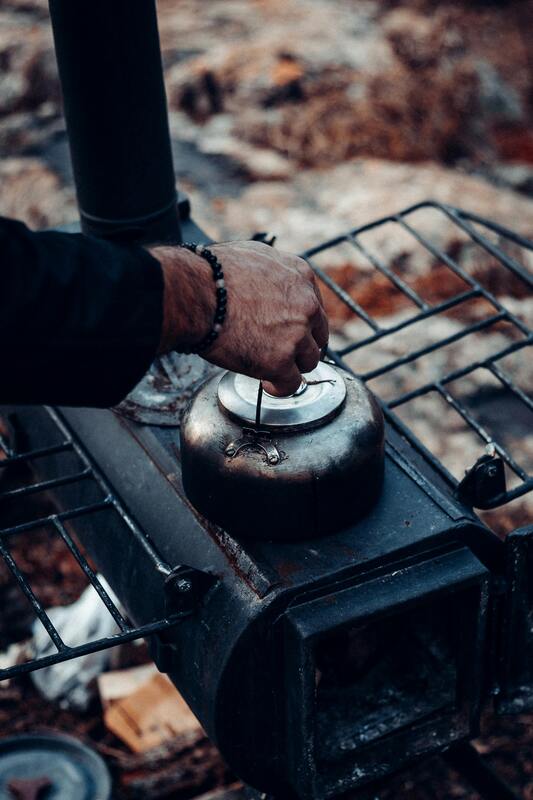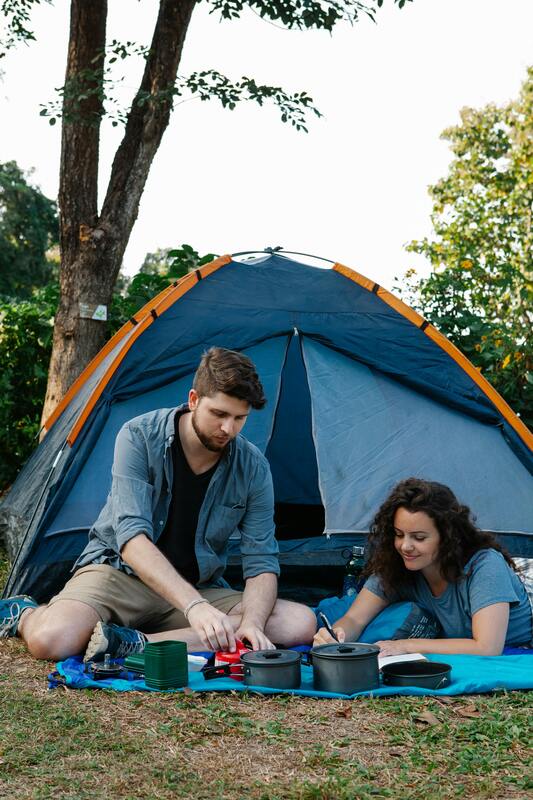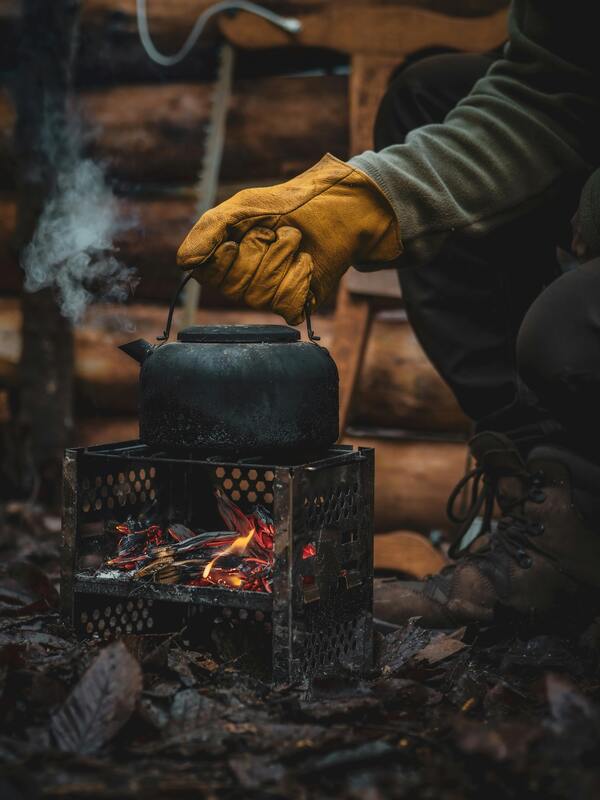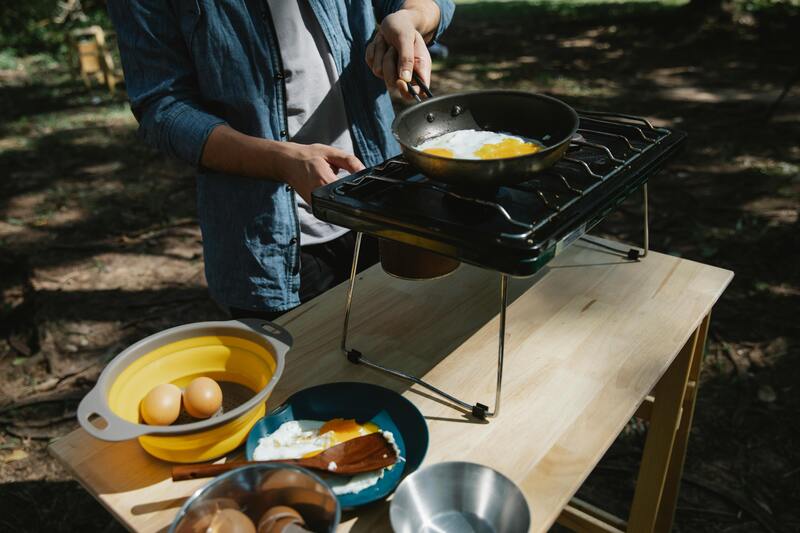**A. Ways to Cook Outside**
* **Grilling:** You're basically cooking with direct heat, could be from gas, charcoal, or even wood. Great for burgers, veggies, and those fun skewers. You can use small portable ones, grills at campsites, or even a tiny one on a table.
* **Camping Stoves: ** These are small stoves that don't use a ton of fuel, so they're good for backpacking or camping.
* *Canister stoves: * Super light; they use those gas cans.
* *Liquid fuel stoves: * Use white gas or kerosene. They work even when it's cold.
* *Alcohol stoves: * Really light, quiet, and they don't have many parts. Works well for short trips.
* **Dutch Ovens & Big Pots: ** Big, strong pots you can use for stews, soups, and even baking bread right over the fire. You can use them in campfires, on grills, or with charcoal.
* **Cooking Over a Fire: ** Literally cooking over an open fire using a tripod, a metal grate, or even just sticks. Make sure you use pots and pans that are safe for fires, like cast iron or stainless steel.
* **Small Ovens & Smokers: ** Small ovens you can take with you so you can bake or cook things slowly. Smokers let you add flavor to meats and fish with wood chips – it's like cooking with smoky flavor.
**B. Pots, Pans, and Other Cooking Stuff**
* **Pots & Pans:**
* *Materials:* Stainless steel lasts, and it's easy to clean. Aluminum is light and heats up fast. Cast iron holds heat well, great if you want to hear something.
* You can get nonstick ones, but they might not last as long when you're outside.
* **Flat Pans: ** These are good for pancakes, eggs, or stir-frying. Use them on stoves, grills, or open flames.
* **Kettles & Coffee Makers:** You need something for hot drinks! You can use a portable coffee press, a percolator, or just a simple kettle for boiling water.
* **Tools: ** Tongs, spatulas, stirring spoons – get ones that can handle heat. If you're backpacking, get ones that fold up or are super light.
* **Knives, Boards, etc.: ** Get a light cutting board and a knife or multi-tool to chop food. Also, grab some food-safe containers for chopping, mixing, and keeping food.
**C. What You Burn to Cook**
* **Charcoal:** It's classic for grilling. It gives food a smoky taste. Large pieces heat up faster than the small brick ones, but the small ones burn for a longer time.
* **Propane or Butane Gas: ** Use these with portable stoves and grills. The temperature is easy to control, it's cleaner, and it works well.
* **Wood: ** For campfires or wood-burning stoves. Gives your food a natural smoky taste.
* **Solid Fuel Tablets: ** These are small things you can burn in backpacking stoves. They burn clean and don't weigh much.
**D. Other Useful Things**
* **Wind Shields:** These bounce heat back to your pot, so you don't waste heat when it's windy.
* **Heat Spreaders:** They spread the heat under pots to keep food from burning.
* **Small Tables:** These keep your cooking stuff off the ground. They keep your stoves and grills steady.
* **Thermometers:** Use them to make sure your food is cooked safely. You can get instant-read ones or ones with a probe.
* **Cleaning Supplies:** Get some soap that's safe for the environment, scrubbing pads, and something to dry dishes on.
**2. What Outdoor Cooking Stuff is Made Of**
* **Stainless Steel:** Strong, doesn't rust, easy to clean, but heavier than aluminum.
* **Aluminum:** Light, heats up fast, but it can bend if it's right on a flame.
* **Cast Iron:** Great at holding heat. It's heavy and you need to treat it so it doesn't rust.
* **Titanium:** Super light, doesn't corrode, usually for backpacking pots and pans.
* **Silicone:** Used for folding tools, lids, and baking stuff. It can handle heat.
**3. Staying Safe**
* Always cook where there's good air flow, away from tents or anything that burns easily.
* Put stoves or grills on steady surfaces or they could fall over.
* Have water or a fire extinguisher close by, just in case.
* Pay attention to the rules about campfires or charcoal in that area.
**4. Packing it Up**
* Get pots and pans that fold up, stack, or fit inside each other.
* Light stoves and tools are best for backpacking.
* Carry fuel in containers that are made for it.
* Put everything in waterproof bags or boxes so it doesn't get ruined.
**5. Cooking Efficiently**
* Cut veggies, marinate meat, and measure spices before you go.
* Use grills for cooking fast at high heat, and coals for cooking slowly.
* Use things for more than one thing—a pot can be used as a kettle.
* Wash things as soon as you can so bugs stay away, and stuff doesn't rust.
* Try cooking at home first so you know how long things take and how to control the heat.
**6. What to Cook Outside**
* Grilled meats, fish, and veggies.
* One-pot stews and chili.
* Breakfasts: eggs, bacon, pancakes.
* Foil packets with veggies, potatoes, or fish.
* Baked stuff like bread or muffins in Dutch ovens.
* **Grilling:** You're basically cooking with direct heat, could be from gas, charcoal, or even wood. Great for burgers, veggies, and those fun skewers. You can use small portable ones, grills at campsites, or even a tiny one on a table.
* **Camping Stoves: ** These are small stoves that don't use a ton of fuel, so they're good for backpacking or camping.
* *Canister stoves: * Super light; they use those gas cans.
* *Liquid fuel stoves: * Use white gas or kerosene. They work even when it's cold.
* *Alcohol stoves: * Really light, quiet, and they don't have many parts. Works well for short trips.
* **Dutch Ovens & Big Pots: ** Big, strong pots you can use for stews, soups, and even baking bread right over the fire. You can use them in campfires, on grills, or with charcoal.
* **Cooking Over a Fire: ** Literally cooking over an open fire using a tripod, a metal grate, or even just sticks. Make sure you use pots and pans that are safe for fires, like cast iron or stainless steel.
* **Small Ovens & Smokers: ** Small ovens you can take with you so you can bake or cook things slowly. Smokers let you add flavor to meats and fish with wood chips – it's like cooking with smoky flavor.
**B. Pots, Pans, and Other Cooking Stuff**
* **Pots & Pans:**
* *Materials:* Stainless steel lasts, and it's easy to clean. Aluminum is light and heats up fast. Cast iron holds heat well, great if you want to hear something.
* You can get nonstick ones, but they might not last as long when you're outside.
* **Flat Pans: ** These are good for pancakes, eggs, or stir-frying. Use them on stoves, grills, or open flames.
* **Kettles & Coffee Makers:** You need something for hot drinks! You can use a portable coffee press, a percolator, or just a simple kettle for boiling water.
* **Tools: ** Tongs, spatulas, stirring spoons – get ones that can handle heat. If you're backpacking, get ones that fold up or are super light.
* **Knives, Boards, etc.: ** Get a light cutting board and a knife or multi-tool to chop food. Also, grab some food-safe containers for chopping, mixing, and keeping food.
**C. What You Burn to Cook**
* **Charcoal:** It's classic for grilling. It gives food a smoky taste. Large pieces heat up faster than the small brick ones, but the small ones burn for a longer time.
* **Propane or Butane Gas: ** Use these with portable stoves and grills. The temperature is easy to control, it's cleaner, and it works well.
* **Wood: ** For campfires or wood-burning stoves. Gives your food a natural smoky taste.
* **Solid Fuel Tablets: ** These are small things you can burn in backpacking stoves. They burn clean and don't weigh much.
**D. Other Useful Things**
* **Wind Shields:** These bounce heat back to your pot, so you don't waste heat when it's windy.
* **Heat Spreaders:** They spread the heat under pots to keep food from burning.
* **Small Tables:** These keep your cooking stuff off the ground. They keep your stoves and grills steady.
* **Thermometers:** Use them to make sure your food is cooked safely. You can get instant-read ones or ones with a probe.
* **Cleaning Supplies:** Get some soap that's safe for the environment, scrubbing pads, and something to dry dishes on.
**2. What Outdoor Cooking Stuff is Made Of**
* **Stainless Steel:** Strong, doesn't rust, easy to clean, but heavier than aluminum.
* **Aluminum:** Light, heats up fast, but it can bend if it's right on a flame.
* **Cast Iron:** Great at holding heat. It's heavy and you need to treat it so it doesn't rust.
* **Titanium:** Super light, doesn't corrode, usually for backpacking pots and pans.
* **Silicone:** Used for folding tools, lids, and baking stuff. It can handle heat.
**3. Staying Safe**
* Always cook where there's good air flow, away from tents or anything that burns easily.
* Put stoves or grills on steady surfaces or they could fall over.
* Have water or a fire extinguisher close by, just in case.
* Pay attention to the rules about campfires or charcoal in that area.
**4. Packing it Up**
* Get pots and pans that fold up, stack, or fit inside each other.
* Light stoves and tools are best for backpacking.
* Carry fuel in containers that are made for it.
* Put everything in waterproof bags or boxes so it doesn't get ruined.
**5. Cooking Efficiently**
* Cut veggies, marinate meat, and measure spices before you go.
* Use grills for cooking fast at high heat, and coals for cooking slowly.
* Use things for more than one thing—a pot can be used as a kettle.
* Wash things as soon as you can so bugs stay away, and stuff doesn't rust.
* Try cooking at home first so you know how long things take and how to control the heat.
**6. What to Cook Outside**
* Grilled meats, fish, and veggies.
* One-pot stews and chili.
* Breakfasts: eggs, bacon, pancakes.
* Foil packets with veggies, potatoes, or fish.
* Baked stuff like bread or muffins in Dutch ovens.



